The Independent's journalism is supported by our readers. When you purchase through links on our site, we may earn commission.
Can vodou succeed where Western medicine fails? My journey to Haiti in search of a cure for chronic pain
In an exclusive extract from her new book, Julia Buckley retraces her journey to relieve her chronic pain
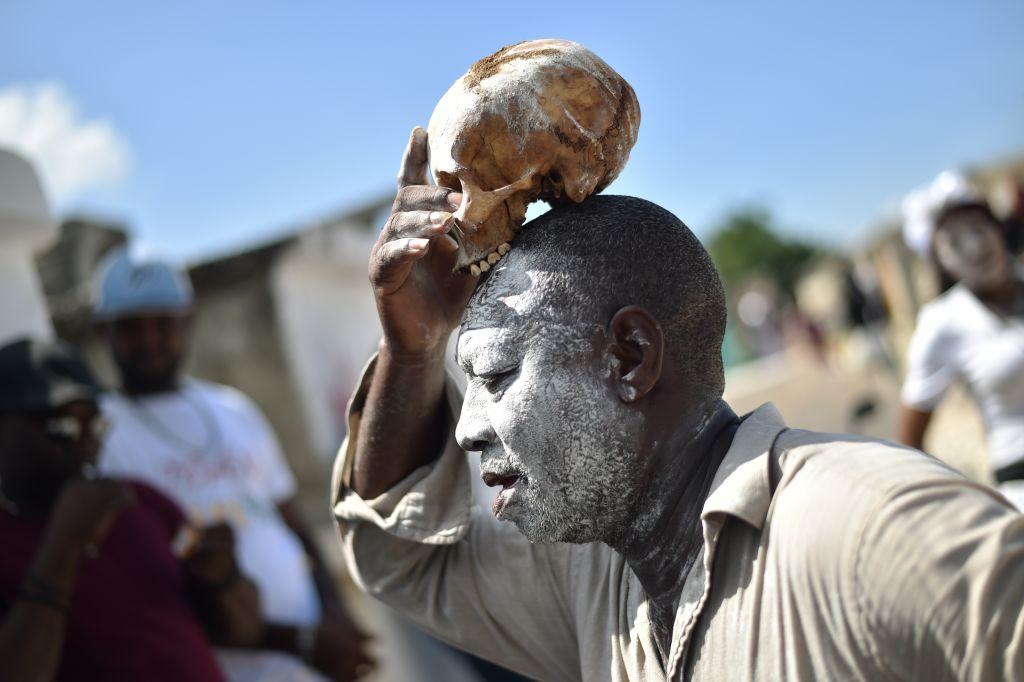
In May 2012, I had an accident at work. Not a bad accident, mind – the most mediocre one you can imagine. I reached for a cup of coffee, something in my neck slipped and nicked a nerve (at least that’s the theory), and just like that, I was plunged into the world of chronic pain. It took me four years to get out.
After going the medical route for two years, with zero progress – and having nothing to lose, because I wished I was dead – I decided to look at alternative therapies. I’d been a travel journalist before the accident, so going to places like Bali, South Africa and China to look at traditional medicine and healing felt, in a way, like I was reclaiming a part of my identity. Plus, researching chronic pain – which is essentially in your brain – and learning more about the placebo effect and mind-body connection, I wondered what other cultures had to offer. Herbert Benson, the Harvard professor who’s big on the mind-body connection, has written that traditional healers in Zimbabwe have a better grasp of patient psychology than Western doctors. That was the starting point for my book, Heal Me.
I went to Haiti in 2015. I’d read enough about vodou – not racist, Westernised “voodoo” but the real thing – to think it could help me. I wanted to meet houngans (male priests) and mambos (female priests) who, I thought, might psych me out of my pain.
I wasn’t expecting what I found – a beautiful country, magazine-worthy beaches, people who welcomed me, keen to share their culture. After four days of what felt more like a holiday than a research trip, I checked in at the Oloffson hotel in Port-au-Prince – famous for its ‘gingerbread house’ architecture, its starring role in Graham Greene’s The Comedians, and its houngan owner. Could the loa (spirits) like Baron Samedi (a loa of the dead) and Erzulie Freda (a capricious female loa who demands presents from her followers) help me?
Here’s what happened, in an extract from the book.
Heal Me, published by W&N, is out now
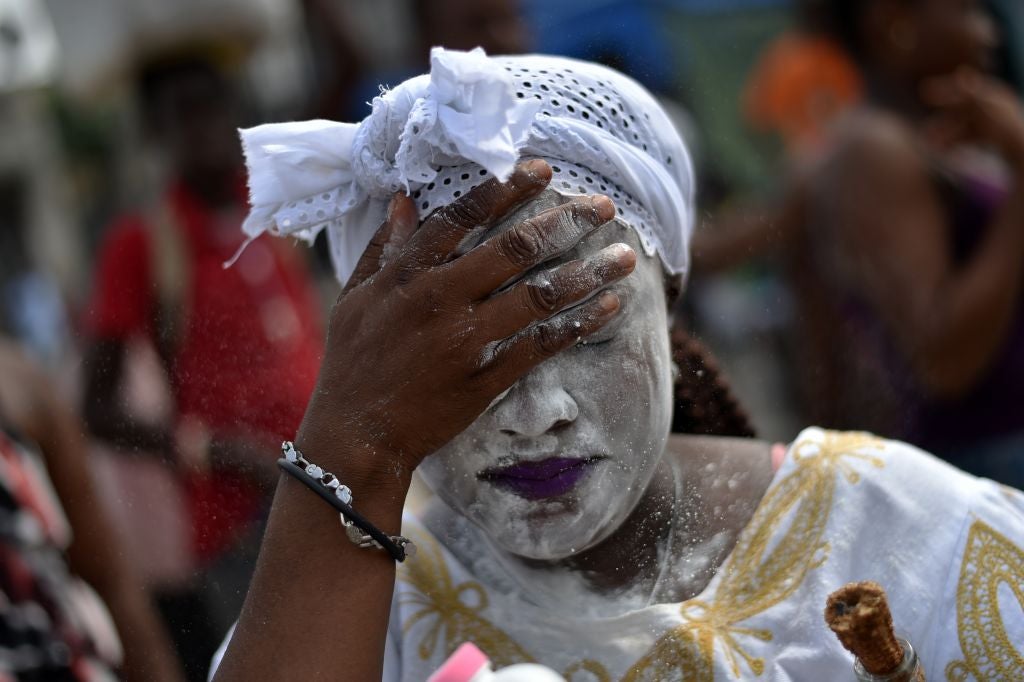
“The owner is a houngan,” I said to Serge as we pulled up at the Oloffson to be confronted by a lifesize Baron Samedi (in the stairwell leading to the gingerbread house.
“I know,” said Serge. “I know him slightly.” Serge agreed to introduce me, but he was nowhere to be found.
Richard Morse was his name. He was half Haitian, half American, and having stalked him online, I’d decided he would fascinate me. He’d grown up in New England but moved to Port-au-Prince in 1987 to run his mother’s family’s hotel. He was a houngan, according to the Economist, and had a vodou rock band, RAM, that played every Thursday night. Of course, the Thursday I was in town, it was cancelled.
I was at the check-in desk, asking (as the doom-laden TripAdvisor reviews had exhorted) whether I might be able to see a couple of rooms, when an American voice behind me said, “Put her in the Graham Greene.” I turned round to find him studying me with an ironic smirk. At six foot, I was used to bending down to talk to people, but with Richard Morse, I came up to the bottom of his ponytail.
“You’re a writer, right? Gotta put you in the Graham Greene,” he said. I had tweeted him, asking for an interview (I hadn’t mentioned what about, lest, like everyone else, he stopped replying to me). He was in America till Saturday, he’d said, and I’d written back, great, I’ll come Saturday. And he had not replied.
“Is it really where he stayed?” I asked with the ingratiating smile I usually reserved for doctors.
“I dunno,” said Richard Morse. “Probably not.” He swallowed a laugh. “You wanted to talk to me, right?”
“Yes!” I squeaked.
“I’ll be around,” he said, and loped off. An unimpressed-looking woman showed me to my room – in an annexe which, by the looks of it, might not have been updated since Greene’s stay – and brought a pitcher of water. In the time it took to climb the stairs, the mosquitos drained approximately one third of my blood. I showered in case they were attracted to ingrained sweat, and put on the sundress that the aid worker on the plane had prophesied would get me killed. I took out my diary to circle my next antimalarial dose. Then I smothered myself in citronella and walked over to the main building.
There was reggae playing in the bar, where two busts of Jean-Jacques Dessalines monitored a taciturn barman. I walked through onto the patio and ordered a G&T, as I imagined the war correspondents did when they stayed here – for those reporting on elections, coups or everyday violence, the Oloffson was the only place to be. Suddenly, Richard Morse was sitting opposite me.
I made small talk about the hotel – how wonderful! How historic! What a place to be sitting, here where Jackie O, Mick Jagger and Gielgud had all sat! – and he looked disgusted. Richard Morse clearly didn’t do small talk. I took a swig of my G&T.
“So I hear you’re a houngan,” I said, boldly.
“Who told you that?” he asked.
“Read it in the Economist,” I said. “Serge said you were, too.”
He shook his head: “I thought you wanted to talk politics.” Richard Morse’s outspoken Twitter feed – anti-government, anti-American government – made him the first port of call for lazy journalists.
“Oh! No,” I said, trying my best to look fearless. “I want to talk vodou.”
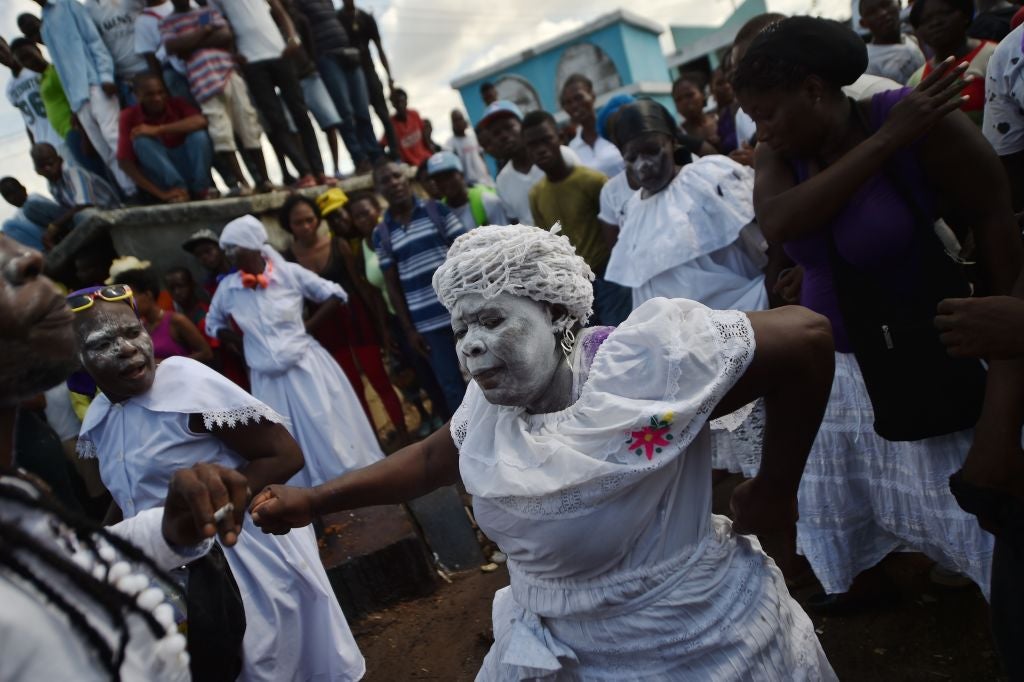
He’d been brought up atheist – “as a white man”, as he put it – in America. His father had been an atheist, his mother a mambo. Richard had gone to Haiti for the first time at 16, and fallen for it. And the feeling had been mutual: on a subsequent visit, he’d heard the loa knocking on the window, calling him all night. He’d gone on to study anthropology at Princeton, but when his father died, he’d returned to Haiti and become a houngan.
Talking about his training was the first time Richard Morse really smiled. “It was unbelievable,” he said, with the bliss of a man who’d seen God. “It made me realise that it’s all connected, yeah? Vodou, Protestants, Catholics, the Pope ... Princeton, Haiti ... it’s all connected.” I remembered Jero Pura telling me to pray to my own god. What if it was all connected? What if vodou wouldn’t just shock my pain away, but might actually heal me?
He didn’t do it as a vocation, he was at pains to point out. He only did it to “take care of stuff”.
I swallowed. It was becoming clear that I was the Oloffson’s only guest tonight, but I couldn’t leave Haiti without some kind of closure. I reminded myself that the scene from Live and Let Die which had played in two decades of nightmares – Roger Moore and Jane Seymour in the graveyard, Baron Samedi erupting from the earth and laughing them to hell – was a film, voodoo not vodou, and that the nocebo effect might reset my brain.
“What kind of stuff?” I asked.
“I mean, someone might come along,” said Richard Morse, and he paused. “And I might think, you know, maybe I can do something for that person. I don’t – I mean, you know – I don’t have a sign outside saying ‘I do readings’, or whatever.”
“And if someone comes along,” I said, casually, “and you think you can do something for them, do you tell them?”
“I’ve helped a few people,” he said, cryptically. And then he told me.
He’d helped one woman’s cancer, though he didn’t want to take official credit for that. Been called to another who’d just come back from the dead to “get her going”. Healed the paralysed arm of a woman selling art by the roadside at Saut-d’Eau, just like that. My ears pricked up.
“Could she immediately lift it?”
He paused. “It’s a miracle,” he said, jazz hands in his voice. Then he said, more quietly: “Frightening.” He had stopped after that, because he didn’t want to feel obliged to go around healing people.
The nape of my neck was prickling, and for once it wasn’t a mosquito bite.
We circled each other in small talk, and then I tried again. Do you think you could heal anyone, I asked. He said he didn’t know. I said: you should try. Once in a while, he said, I come across someone and – he paused, stared into the distance – give it a shot. Ask God to help this person.
“Will you help me?” I said.
I told him about the coffee, and the diagnosis, and the COPE course, and the drugs, and Kevin and Bali and everyone who’d tried to be my Jesus but hadn’t been. I said: maybe you’re it.
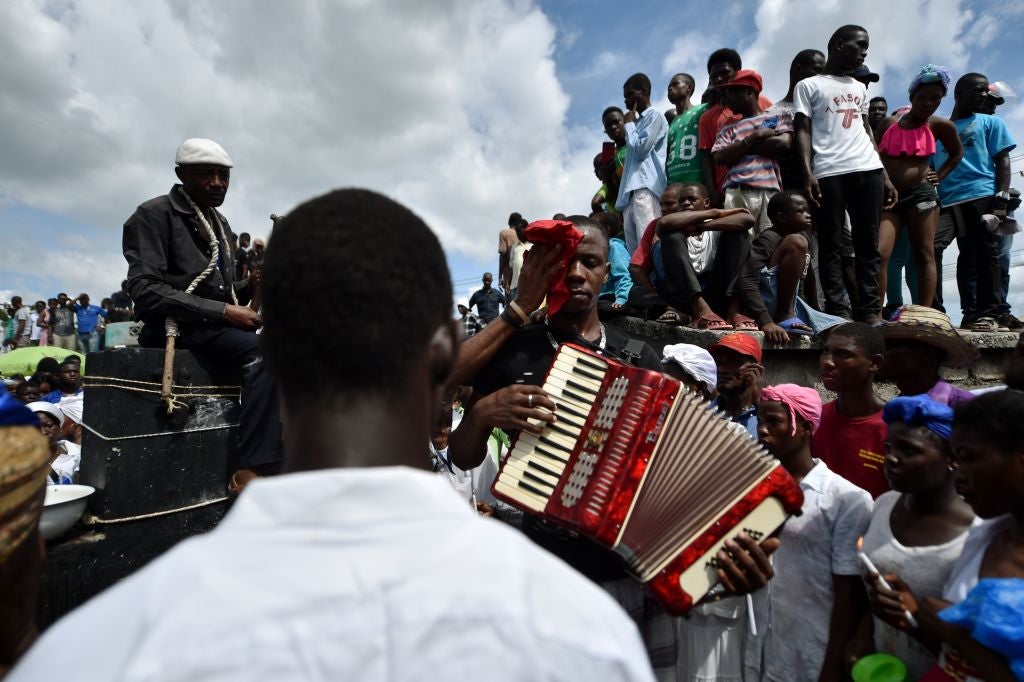
“So this is what you’re doing,” he sighed. “Looking for someone to fix you.”
“I just want someone to make me not in pain,” I said. And then, in a small voice, I added: “And maybe you’re that person.”
“Wouldn’t that be funny,” said Richard Morse.
So would you help me, I asked.
Would I try, he said.
Would you try, I said.
Would you like that, he said, a hint of anger in his voice.
“I would love you to,” I said. “Yeah.”
We both studied our drinks. I’m still in love with you, girl, Alton Ellis sang from the bar.
Richard Morse dragged the air into his nostrils. Once. Twice. I kept my eyes on my drink.
“Don’t touch the ice,” he said. “I have to go get the keys.”
*
It’s a funny thing, trauma. I thought I had a perfect memory of what happened that night, even though it comes as flashes: instant followed by instant instead of the normal spool of film. Thinking about them now, they pop up, one by one, moving slowly like a turgid PowerPoint presentation, only these are slides that knot my stomach, constrict my throat and swell the blood vessels in my eyeballs as I sit through them, powerless to hit the off switch, knowing I must let them run their course.
I remember the punch of fear as he jumped up to get the keys. Realising it was on and wishing it wasn’t. Offering to do it in the morning, saying “I don’t want to pressure you,” and him saying darkly, “That’s not what it is,” as he strode off.
I remember walking through the garden, breath shallow with anticipation as it always was before a treatment I prayed could be The One, stealing a glance at the dark pool, thinking, “That’s where the suicide was in The Comedians.”
I remember being in a building round the back of the pool – lights off, silence except for his jangling keys – walking past silhouettes of gym equipment barely lit by a feeble moon.
I remember my stomach tightening as we stopped at a padlocked door, and trying to make eye contact with Richard Morse as he rapped three times, then took a key to the padlock.
The flood of cortisol as I followed him in, to a hotel room lit by a naked oil lamp burning on the floor: clusters of religious symbols, figurines, bottles plugged with candles and strips of cloth set around the room at regular intervals.
The catch in my throat and the blood vacuuming from my legs as I took in the black top hat of Baron Samedi, cocked at a jaunty angle and hung from the headboard, his stick propped up beside the double bed, and a rush of regret as Richard Morse gently closed the door behind me and I realised I was going to die.
My pores opening like floodgates and haemorrhaging sweat, trying to make me slippery as an eel, as he started a strange, jerking shuffle – to the bed, back to me, then around me, then standing silently behind me.
His hands slipping along my soaked skin as he grappled with my neck, rubbing the skin and pulling things off – dress strap, bra strap, the pink elastic in my hair – as he yanked his fingers down the top of my spine, across my shoulder and down my arm, each time more violent than the last, each time my dress dragged a little lower. I remember saying in a tiny voice, “Please don’t crack my neck,” and him lumbering round, face towards mine, breath hot on my cheekbone and eyes rolled back in his head, possessed. “Hmm?” I remember him saying.
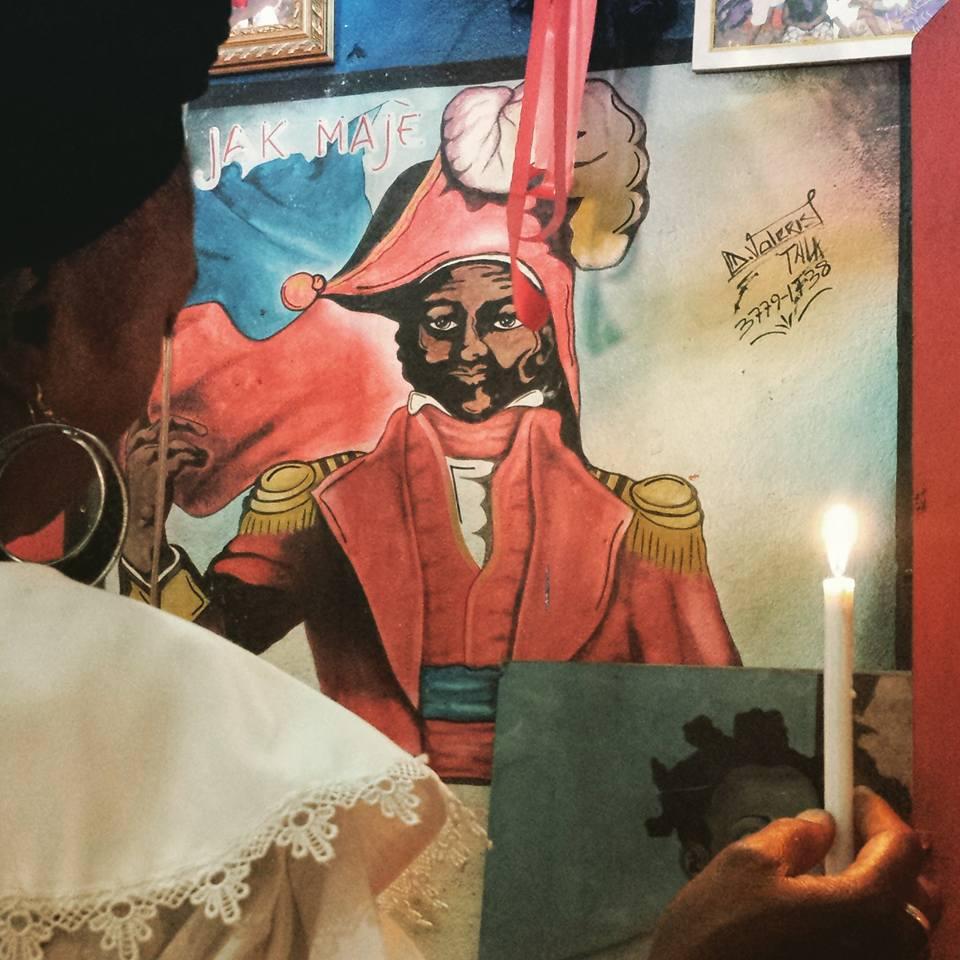
I remember trying to zone out as he pawed at me, wondering whether, if I screamed, he might come out of his trance or someone in the hotel might come running. And I remember realising that not only would nobody in the hotel hear me, three buildings away with the reggae turned up, but that there was nobody in the hotel to hear a scream that night, other than the staff.
I wondered if he’d rape me first or just break my neck.
I remember praying: to God, Jesus, Miffy and my grandmother, to Charmayne’s celestial beings and Patrick’s holy colours, to whatever was in that room – because I could feel something in that room – to show mercy. I remember repeating silently, desperately, that I had come in good faith, that I wanted only to be healed, as he shuffled off towards a cupboard, bobbing at the knee. I remember turning for the door while he was in the cupboard, and deciding I wouldn’t make it out before he caught up.
I remember a warm liquid trickling between my thighs as he shuffled back towards me, and wondering whether it was only sweat or if I’d wet myself.
I remember the relief that maybe he would only rape me as he stood nose to nose and demanded, in a high-pitched voice, that I give him “something pretty”, and the dawning realisation, as I picked up the pink elastic band that he’d pulled from my hair and offered it to him and he pressed again, is it pretty, that Erzulie was in the room, now – flighty Erzulie who smelled of roses and demanded presents from her adoring male followers – and maybe she would protect me from the Baron. The flood of hope that perhaps I would survive, and the desperation to find something pretty enough to engage her sympathy. I remember telling her timidly that right now I didn’t have anything, that the elastic band wasn’t worthy of her, swearing to bring her something suitably pretty in the morning and adding, in my head, if only you let me live.
I remember feeling his heavy presence – or maybe Erzulie’s, or the Baron’s – behind me, as he directed me into the cupboard; then inside, gazing in horror at another flame burning, more bottles and figurines and stuff – stuff like necklaces and souvenir bottles of holy water and pots containing the spirits of the dead. Realising I was cornered and not knowing who I was more scared of, the possessed man behind me, or whatever was guarding the shrine in front.
I don’t remember how it ended, only that it did. And that we walked back into the hotel in silence and sat down on the terrace outside, above the statue of Baron Samedi, and I realised he had let me live.
But trauma is a funny thing. Because when I look back at the transcript – I still can’t listen to the recording, so I paid someone to transcribe it – there was more to it than that. It would seem I’m an unreliable narrator.
I remembered the room as deathly silent, the only sound his heavy breathing. Which is there, in the recording, but there’s also a ticking noise which doubles, disappears, then starts up a rhythm – like a paradiddle, said Allie, who listened to it for me – and goes silent. There’s a bottle clanking against other bottles, a car alarm honking far off in the distance. My voice near the start whispering, “What are you going to do?” – it must have been when he touched my neck – and saying politely, after 15 minutes of silence, “Thank you so much – do I need to do anything, like get some wine?”
And there’s an exchange. One right after the long back and forth about which pretty thing I might be able to give him.
“My neck does feel much better,” I say. “I think my back does, too.”
Tick, tick, tick, goes the sound in the background.
“There is ... you ... there was ... something,” Richard Morse – or Erzulie or Baron Samedi, because he’s still possessed – says. “I don’t know how you got it.”
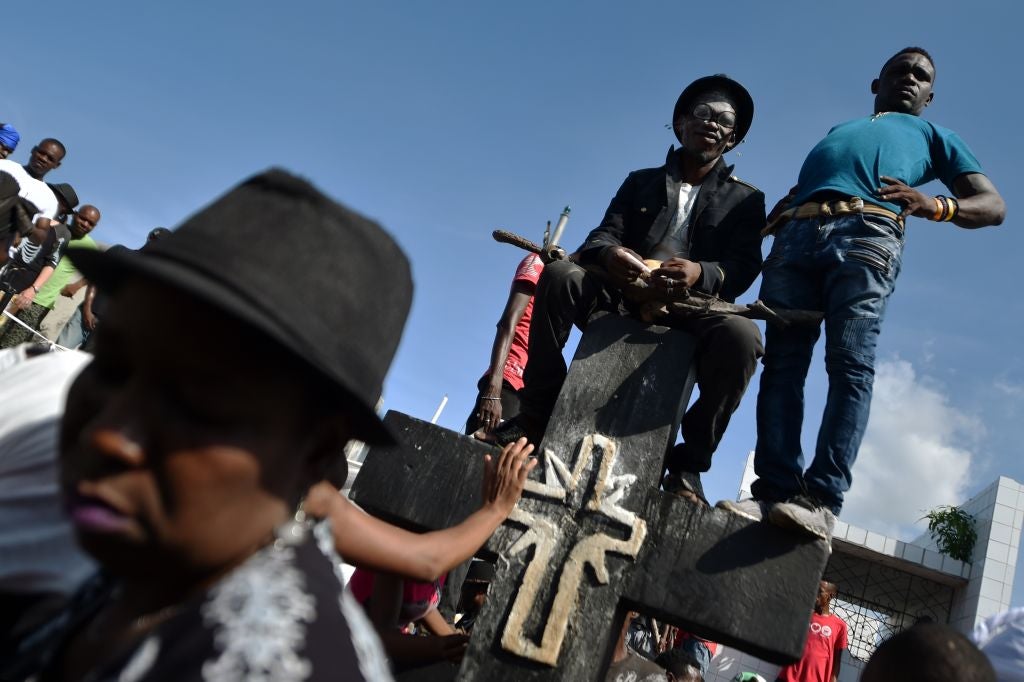
“What kind of thing?” I rush it out.
“Nasty,” he says.
“Really?”
“Yeah.”
“But you took it away?”
“Yeah.”
“Thank you.”
Then he says: “Pray.”
And then it’s silent for two minutes until there’s a bang, a noise like sticks being slapped together four times, and he asks, “You feel good?”
And I say, “Yes.”
“Are you terrified?” he asks as we’re walking out, and I say, “I’m not now.” Then I order us both a stiff drink.
Whenever I would talk to professionals about my pain – doctors, psychologists, hypnotists or Kevins, because they were all the same – at some point in the conversation, every conversation, once we’d established what they thought was a rapport, they would invariably look deep into my eyes and ask me if – really, truly, honestly – I wanted to get better. Janet Williams’s idea of the chronic pain personality may not be universally shared – “It really doesn’t exist,” Ronald Kulich, professor of psychology at Boston’s Tufts University told me – and yet, confronted by my tear-stained face, my stomach stretched with comfort food and my gender, most doctors assumed that, on some level, I was choosing to be ill. You can’t judge someone else’s pain – it’s been proven that medical professionals underestimate their patients’ chronic pain levels by up to 49 per cent. Yet still they doubt us, and because they’re the experts, we end up doubting ourselves. Suddenly I’m beginning not to trust my memory at all.
Whenever they’d ask me if I wanted to get better, I’d say yes as a reflex, but the scepticism in their eyes would always spark a self-interrogation afterwards. Do I really want to recover, I’d ask, or underneath all this, am I secretly happy as a victim? After that night with Richard Morse, I knew the answer.
*
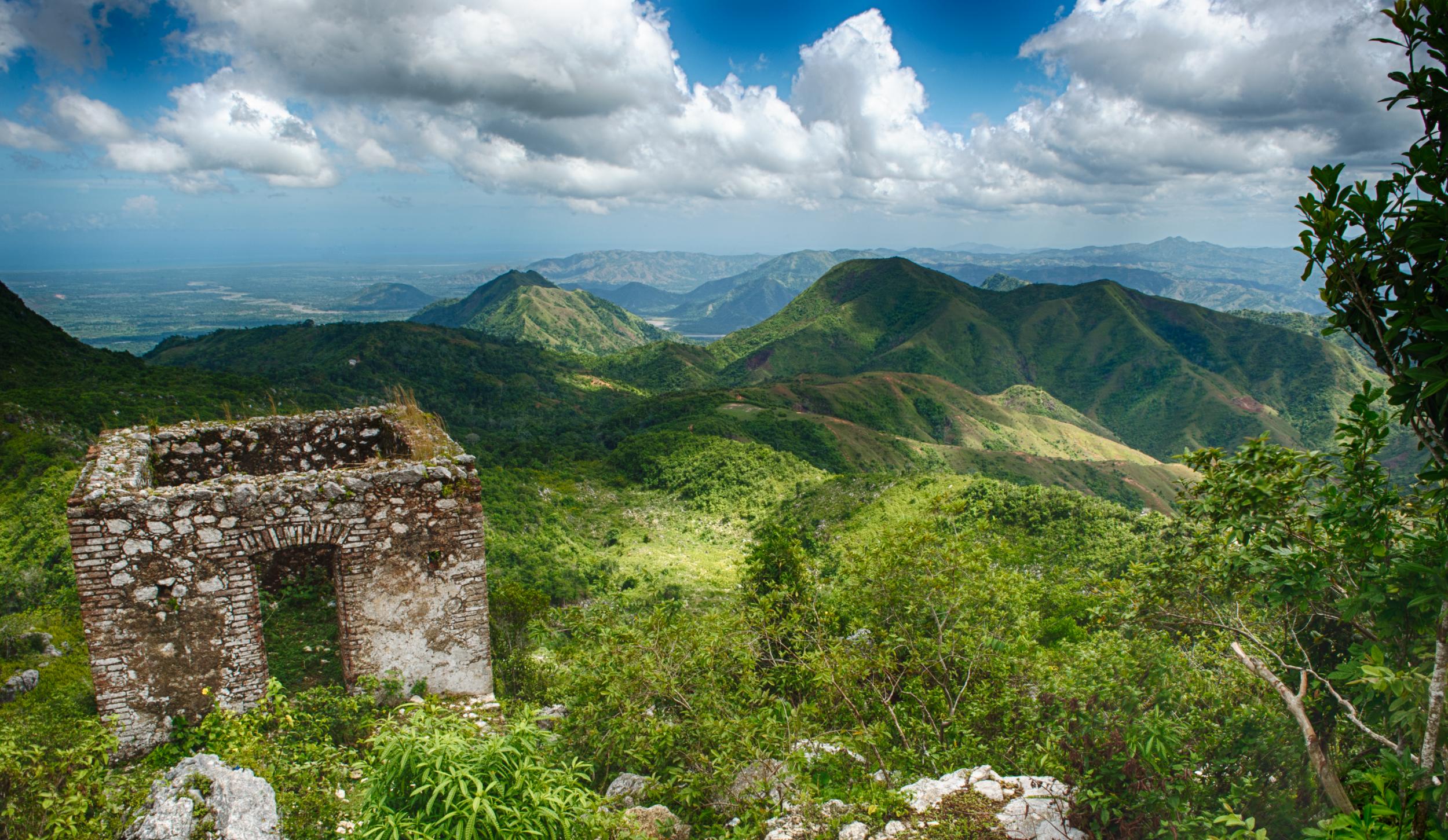
On my first morning in Haiti, after breakfast at the hotel, a man I’d seen eyeing me over our plates of hard bread and bruised bananas had come over.
“I’m Jean,” he’d said.
“Julia,” I’d said.
“Julia,” he’d repeated. “Why are you here? What are you running away from?”
“Nothing,” I’d said primly, gesturing at my Kindle. “I’m on holiday.” He’d narrowed his eyes and handed me a business card. He was a priest.
I wasn’t running away from anything, I’d wanted to scream at Jean. I wasn’t a running away kind of person – if anything, I was the opposite. If something was wrong – physically, emotionally, whatever – I would unpick the situation until it was a tatty pile of string. What I should have done, what I could have done, why I’d said what I did, laughed when I shouldn’t, reached for that f***ing cup of coffee when I’d known it was already cold. If I had a problem, I confronted it. That’s why I was in Haiti, after all. That’s why I was on this whole frigging journey, building up debt that would forever cripple me, even with the book money, even if I got another job again. I was chasing down my illness.
But I hadn’t been doing the journey right, it dawned on me months later, when I was going over that night at the Oloffson for the thousandth time. I’d been travelling but not engaging; in fact, I’d been turning up, acting interested, then turning tail and running away as fast as my flat feet would carry me into the next time zone.
I’d stopped swirling Patrick’s colours at people’s solar plexi after a few days, and packed away the CBD oil in the kitchen cupboard as if it were a rabbit’s foot against a greater illness. I’d stopped my Balinese prayers the day Miffy died, used the last of the oil to anoint her dead body. I’d excised all memory of Charmayne’s kindness so the hope she’d sparked in me no longer rent me apart. I’d been telling myself I was on this journey to find the truth as quickly as possible, but actually, all I was doing was legging it every time I reached the crunch.
That night at the Oloffson it all changed, though. That’s why I was so shaken.
By the time I solved the puzzle, I had done far scarier things. Been cut with a razor in the Aids capital of the world. Slaughtered a chicken and bathed in its blood. Jumped in icy mountain water and had a neck vertebra crunched out of place. And I could think back on all that stuff and process it, but every time I thought back to my night at the Oloffson I’d have the same visceral reaction: gobstopper expanding in my throat, pressure blood-shotting my eyes. Why?
Eventually I realised: that night with Richard Morse was the first time I saw the treatment through to the end. I’d always wanted to get better, but that night I realised I’d sell my soul to do it. And that ghastly desperation was more terrifying than any Bond villain or spectral murderer I could think of.
*

I didn’t sleep well in the Graham Greene room, partly because of the trauma, partly because of the heat, mostly because I woke up at 4am with the distinct impression that someone was sharpening a razor along the line between my neck and collarbone.
Please wait till morning, I begged whatever it was. Wait for your something pretty. I won’t let you down. At check-out, I walked to the lobby with a delicate, Modigliani-esque sculpture of a vodou initiate I’d bought as a souvenir the previous day, and asked for Richard Morse.
I have the thing, I said, the pretty thing. Can I go back – there?
Sure, he said, and went to get the keys.
It was different in the daylight, of course. The pool looked just tired, not sinister; the treadmill was a treadmill, not a harbinger of doom. I kept breathing as Richard Morse knocked on the door, felt perfectly calm as we walked in, past the bed and the top hat and into the cupboard. I took the elastic band that had tied up my hair the night before, and knotted it round the sculpture, just in case she’d wanted that all along. I put it down beside the little water bottles (“Holy water,” said Richard. “People bring it to me from all over the world,”) and the bits and bobs perched above the flame. I thanked Erzulie for protecting me last night, hoped the sculpture met with her approval and begged for her help. I believe, I said, I believe in it all. Once I was back in the car, telling Geffrard what had happened, I realised I was drenched in sweat again.
It was only at the airport, once I’d been wheeled to the gate, that I realised my arm wasn’t hurting.
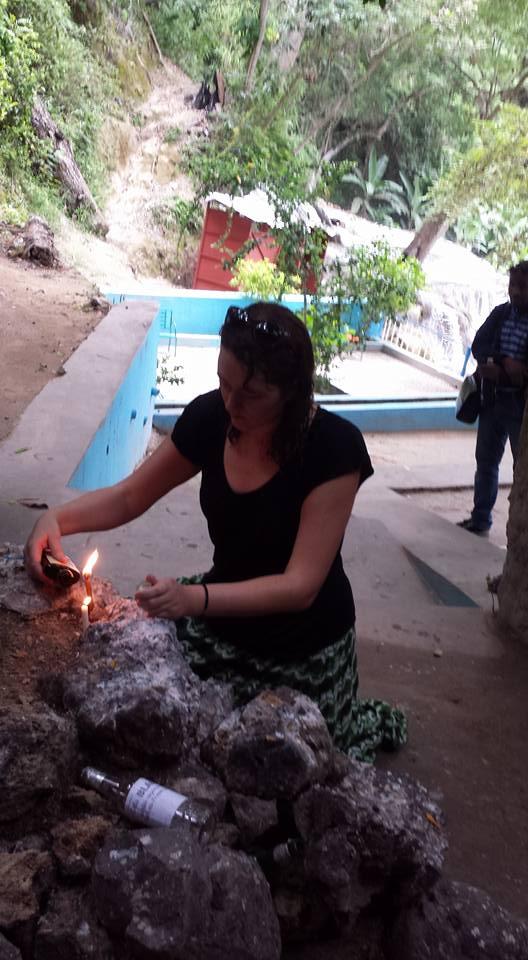
I picked up my bag – the little carry-on case that I normally made everyone else lift in case it dislocated my shoulder – and went upstairs for a coffee. My neck didn’t hurt, either.
I came back downstairs, exaggerating a limp I no longer felt to avoid questioning looks as I sat in the disabled seats. I pre-boarded and asked the cabin crew to lift my case into the overhead locker, asked for an extra pillow to cushion the armrest against my allodynia. But I didn’t need it. I typed all the way to Miami and then to Curaçao, and it didn’t hurt. My friends were at dinner by the time I got to the villa – it was Tanya's 40th birthday and I’d promised to come straight out. Instead I found some rum in the kitchen, took the bottle down to the bottom of the garden where the sea smashed against the wall, and sacrificed it to Agwe, one of Erzulie’s three husbands. Then I got into bed and prayed.
I felt fine the next day. And the next. My friends stared as I went down to the sea twice a day to make the rum sacrifices, outraged at my waste of good liquor. I tried to explain it, but all they wanted to talk about was shagging, not possessions. Although they did quite like the idea of the demon cat.
Back in the bar that night, drinking rum on the rocks – neither food nor ice was allowed after a ceremony with the loa – I’d asked Richard Morse what had happened back there. He didn’t know, he’d said – he never knows. But there was one thing he did.
“I saw what was bothering you.” He’d lowered his voice even though we were the only people in the hotel.
“It looked like some kind of beast,” he’d said. “Some kind of black cat shape.” Wrapped around my neck.
How? Why? I love cats. I don’t believe in demons.
“I don’t know,” he said. “I don’t know what you do, where you’ve been. It was just there. Nasty. Mad at me.”
He’d pulled it out through my fingers, he said – that’s why he’d been dragging his hands down my arms. Then it had started towards him, so he’d taken it to the flame in the cupboard shrine.
I told him that I had a general phobia of people touching my neck, but that it had been worse recently, and I’d been having recurring nightmares in the lead-up to Haiti in which someone would stand behind me and quietly break my neck, and I’d wake up from them in a sweat thinking about Baron Samedi.
“That’s where whatever it was, was,” said Richard. “I would have searched more, but you were a little ... you know.” He was kind, Richard Morse. Even when he was possessed, he hadn’t wanted to frighten me. He’d chosen not to pull it out through my legs for the same reason, he said. I wondered if all houngans were so paternal.
I confided in him that I’d nearly wet myself. I didn’t say that, actually, I might have.
“Do I have to believe for it to work?” I asked, and he didn’t reply.
“How do I know it won’t come back?”
“I have no idea.” My journey worried him, he said. I shouldn’t be going around offering myself to people, telling them to do whatever they wanted to help my pain. “Just don’t start going around and opening yourself up,” he said, all fatherly. “You’ve got to figure out a way so that when you’re going around doing this stuff, you’re not susceptible to ... stuff. Because everyone’s not nice. And if you get a vibe, like, ‘get the f*** out of here,’ get the f*** out of there. See what I’m saying?”
“Yes,” I said meekly, but in my head I added, I don’t care what they do to me, as long as it helps the pain.
“Did you get the vibe to get the f*** out of there today, or were you just scared?” he said.
Oh, just scared you were going to rape and murder me.
“I didn’t want to get out,” I lied. “I was just sure that Baron Samedi was going to kill me.”
But today wasn’t Baron Samedi’s day, he said, it was Erzulie Dantour’s. Erzulie Dantour, represented as the black Madonna. Erzulie Dantour, the protectress of abused women. Erzulie Dantour, who raged and wept at the injustices she suffered – when I’d told Richard earlier about wanting to kill myself and the non-stop tears, he’d said, “That’s very Erzulie Dantour.” Erzulie Dantour, the hysterical woman, the Medea and the Lilith of the loa. I wondered what Erzulie Dantour would say about Yentl Syndrome. I cry at nothing, and cry most of the time.
After delivering the sculpture to Erzulie I was completely pain-free for 48 hours. It was astonishing – wonderful and horrifying in equal measure. I’d had occasional respites from the pain in the previous three years, but they’d either been brief – a matter of minutes – or incomplete (I hadn’t had a bad day for over a month after seeing Patrick, but the pain had always been there, just muted). Vodou, though, had spirited it away in its entirety.
It was probably the placebo effect, I told myself – after all, houngans had mastered the nocebo effect like nobody else. In a way, I hoped it was, because I preferred to believe in an all-forgiving God than in vengeful spirits who freaked out when they weren’t given presents as pretty as they deserved.
But I knew that what I’d felt in that room hadn’t just been in my head.
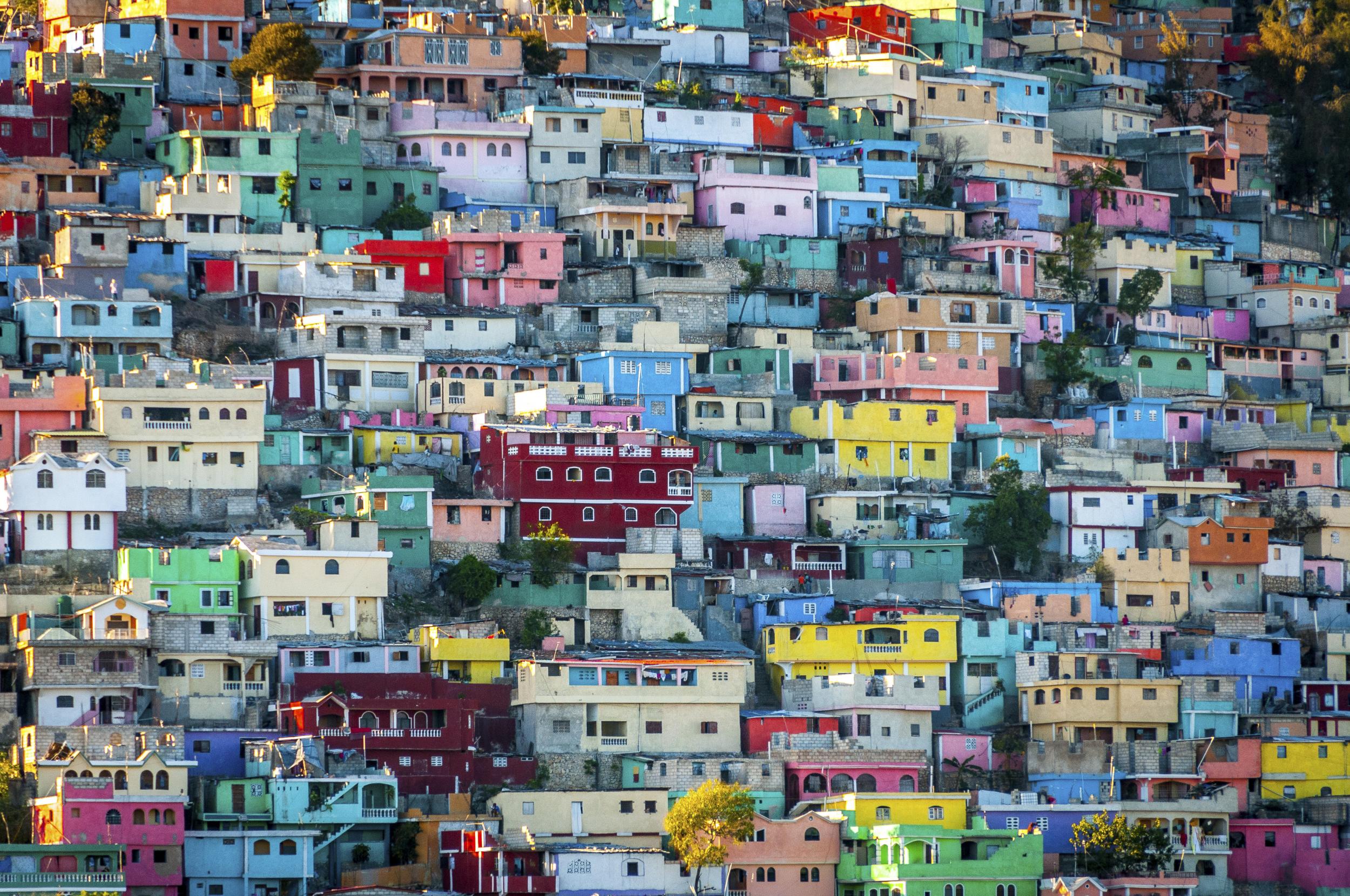
I took it badly when the pain sloped back on the third day. I woke up with a sore neck – maybe because I’d tried to swim four lengths the day before, maybe because I’d tossed and turned one too many times, trying to block out the sound of my friends carousing till 4am, maybe because my offering had only been pretty enough to merit two days’ respite, maybe because the placebo effect is notoriously as instant in its passing as in its arrival. Either way, it hit me harder than any of the disappointments that had gone before. I got a cold. Which turned into food poisoning. The next day I woke up with a fever and crushing pain through my body. I couldn’t move, only gasp for help. My friends iced and monitored me until they were scared enough to call a doctor. An ambulance was called – my symptoms were those of a heart attack, the dispatcher said. Of course, there was nothing wrong with my heart when the paramedics scanned it. It was the nocebo effect in its full, raging force.
For the first time in my life, I’d risked everything, offered up my soul as well as my body, and it still hadn’t worked.
I couldn’t talk about Haiti for a while. I wanted to forget I had ever been. And so I went back to the medical drawing board.
Join our commenting forum
Join thought-provoking conversations, follow other Independent readers and see their replies
Comments
Bookmark popover
Removed from bookmarks